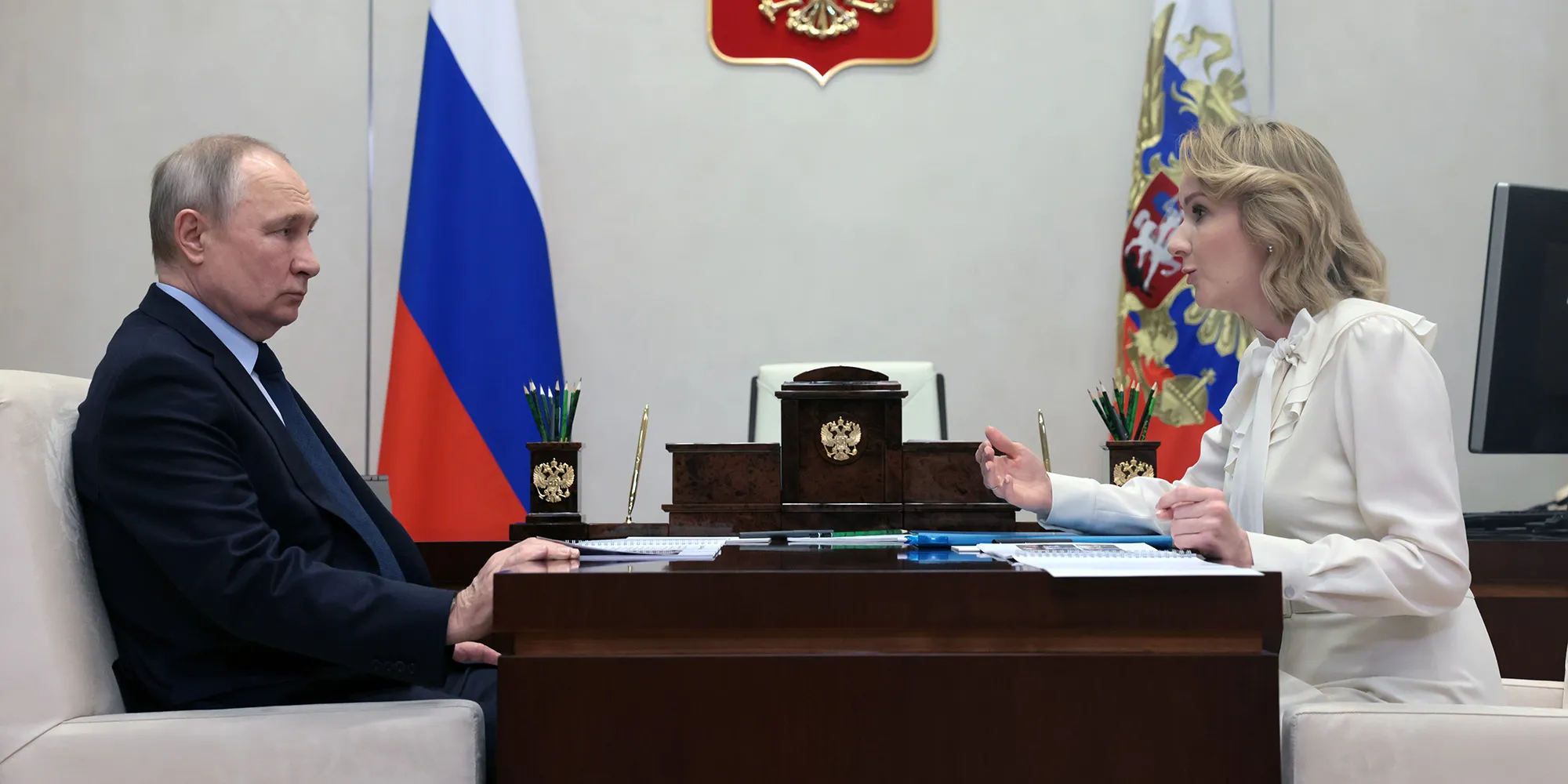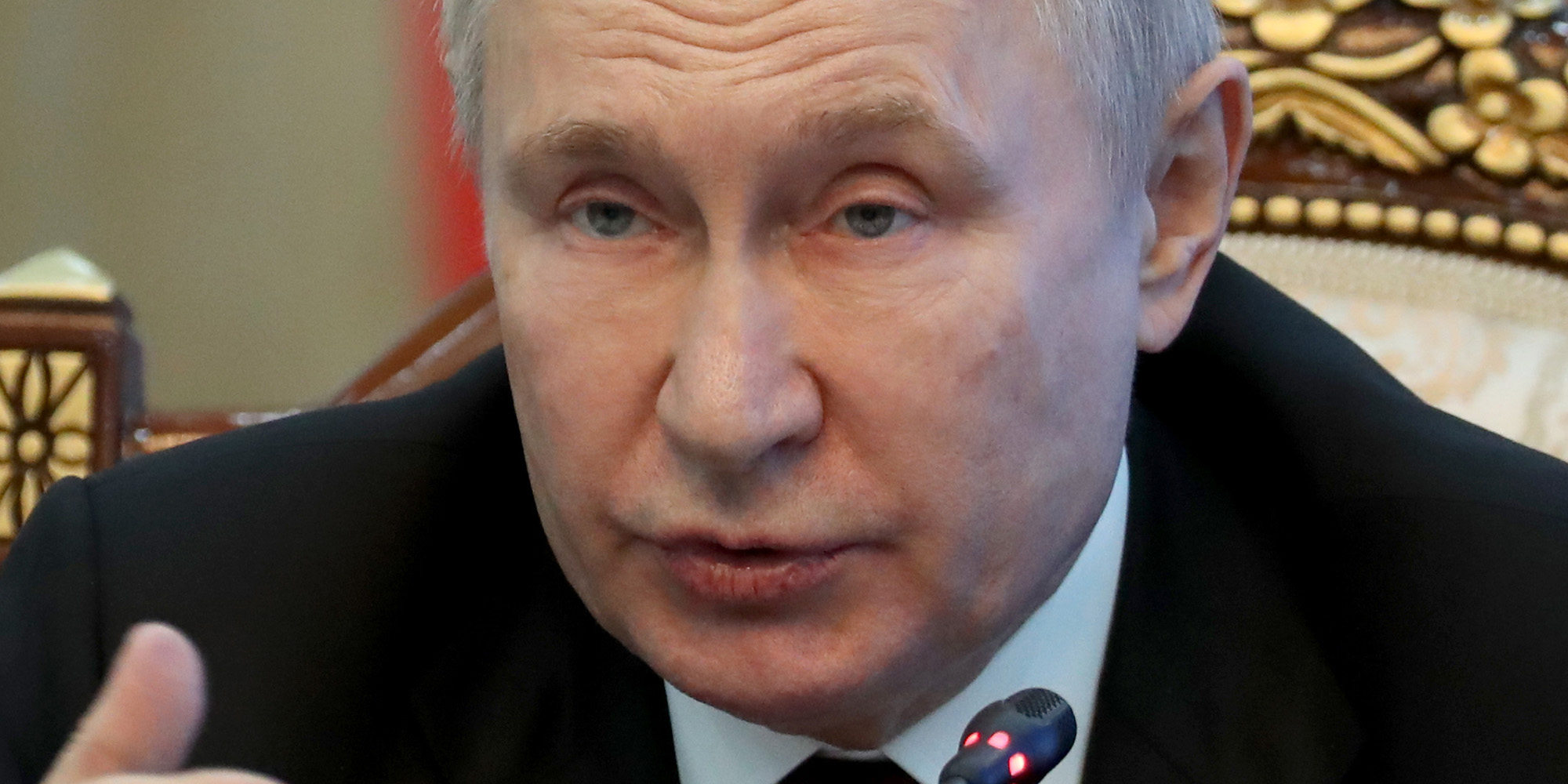And so President Vladimir Putin has and continues to justify the Russian conflict with Ukraine and says that Russia has not committed any unlawful act. Some leaders disagree with that assessment.
Interestingly, the prosecutor and three judges of the International Criminal Court believe Putin and the Russian children’s commissioner, Maria Lvova-Belova, are guilty of war crimes. To that end, the ICC has issued arrest warrants for allegedly overseeing the abduction of Ukrainian children.
 Russian President Vladimir Putin meets with Russian Presidential Commissioner for Children's Rights Maria Lvova-Belova at the Novo-Ogaryovo state residence, outside Moscow, Russia, 16 February 2023. (Photo: EPA-EFE / Mikhail Metzel / Sputnik / Kremlin Pool)
Russian President Vladimir Putin meets with Russian Presidential Commissioner for Children's Rights Maria Lvova-Belova at the Novo-Ogaryovo state residence, outside Moscow, Russia, 16 February 2023. (Photo: EPA-EFE / Mikhail Metzel / Sputnik / Kremlin Pool)
The ICC is a court based in The Hague established by a multilateral treaty called the Rome Statute of the International Criminal Court. There are 123 state parties to the Rome Statute. Russia is not one of the 123 countries, but Ukraine and South Africa are both signatories and thus have international obligations to the other state parties.
South Africa was the first African state to sign the Rome Statute on 17 July 1998 and ratified it on 27 November 2000. Under former president Jacob Zuma, SA attempted in 2016 to withdraw its membership of the ICC. But the high court ruled that the attempt was procedurally unconstitutional and invalid. Thus, South Africa, by being a party to the Rome Statute, has all the international law obligations contained in the 128 articles the Rome Statute imposes on its members.
SA obligations
Two key aspects of South Africa’s international obligations are (1) for South Africa to domesticate the Rome Statute’s provisions into South Africa’s national law. This was done by the enactment of the Implementation of the Rome Statute of the International Criminal Court, Act 27 of 2002, and (2) to cooperate with the ICC by, for example, providing it with information such as documentation, or questioning any person being investigated or prosecuted when requested by the ICC.
It also has the obligation to surrender (or extradite, as the concept is referred to in respect of requesting States) to the ICC any person found on South African territory when the ICC transmits a request for the arrest and surrender of that person.
To give effect to the international obligation to arrest and surrender persons who are on South African territory, Parliament enacted the Implementation Act.
The Director-General: Justice is defined as the Central Authority. On receipt of a request by the ICC for the arrest and surrender of any person for whom a warrant has been issued by the ICC must be referred to the Central Authority. The Central Authority must immediately on receipt of the ICC’s request forward it to a magistrate. And the magistrate must endorse the ICC warrant for execution in any part of South Africa.
The person having been arrested is subject to an inquiry. At the inquiry, the magistrate checks whether the ICC warrant actually applies to that person, whether he or she was arrested lawfully and whether the person’s constitutional rights have been respected.
If these three boxes are ticked, the magistrate must order that the person be surrendered to the ICC. And the person then is removed from South Africa in the custody of a person authorised by the ICC to receive him or her.
It is noteworthy that the President and the rest of the executive, such as the Minister of Justice and the Minister of International Relations and Cooperation, play no role in the matter. The South African arrest and surrender of a person wanted by the ICC and found in South Africa appear to not be affected by geopolitical concerns and the niceties of statecraft.
Omar al-Bashir
Moreover, the complex issue of immunity for heads of state could arise. In the saga involving President Omar al-Bashir (Sudan), the government did not arrest al-Bashir when he visited South Africa even though a warrant for his arrest had been issued by the ICC.
The SA government argued that al-Bashir enjoyed full immunity from arrest by virtue of his position as head of state. Civil society contended the government was obliged to arrest and surrender al-Bashir because no immunity under international law for international crimes exists.
The South African courts ultimately held that immunity did not cover al-Bashir. So, it would seem the same difficulty would apply to President Putin.
Two further interesting aspects arise. First, how could it be that Putin could be subject to an ICC arrest warrant if Russia is not a party to the Rome Statute?
The answer is that Ukraine is a member of the ICC and the alleged crimes are said to have occurred on the territory of Ukraine. Crimes committed on the territory of a state party by a person of any nationality may be prosecuted by the ICC.
The second issue is that Russia’s top investigative body, the Investigative Committee, has opened a criminal case against the ICC prosecutor and the three judges who issued the arrest warrant for Putin on war crimes charges.
The Russians issued statements to the effect that there were no grounds for criminal liability on Putin’s part, and heads of state enjoyed absolute immunity under a 1973 United Nations convention. And “the criminal prosecution is obviously illegal since there are no grounds for criminal liability”.
Ukrainian children
To appreciate the background to the ICC arrest warrant saga, it is worth recalling that Ukraine claims more than 16,000 children have been illegally transferred to Russia or Russian-occupied territories since the hostilities commenced nearly 13 months ago. That is a serious allegation, and if true constitutes a serious international crime. Russia has publicly said it has brought thousands of Ukrainian children to Russia in what it asserts is a humanitarian campaign to protect orphans and abandoned children in the conflict zone.
International criminal justice has moved a long way from the Nuremberg trials after World War 2. For an international criminal court to have issued an arrest warrant for a sitting head of state during an armed conflict between that state and another state would have been unthinkable a generation ago.
Is it unnerving or exciting to imagine what the next generation can expect? Hopefully, there will not be a need for these kinds of difficult and complex issues to be solved.
The effect of the South African Implementation Act is that the geopolitical and nuanced debates that occur in the United Nations General Assembly and other international bodies will play no role should Putin visit South Africa.
Only state functionaries, such as the Director General: Justice and a magistrate, will play any role in his arrest and surrender to the ICC. And they would play a limited tick-box exercise. The President, the Ministers and political role players are not involved at all. The question, I suppose, can be asked: is that a positive thing?
Should international criminal justice be determined by functionaries without any oversight by the executive?
Fair and just
I think every single case must be decided on its own merits. And on that score, it is worth emphasising the words of a famous English judge, Judge Megarry, in a 1969 case called John v Rees: “As everybody who has anything to do with the law well knows, the path of the law is strewn with examples of open and shut cases which, somehow, were not; of unanswerable charges which, in the event, were completely answered; of inexplicable conduct which was fully explained; of fixed and unalterable determinations that, by discussion, suffered a change.”
Some may think: “Of course, President Putin is guilty. And he must be arrested and surrendered to the ICC to stand trial for war crimes.” But, is that fair and just, without affording both sides (Putin on the one hand and the ICC on the other) a reasonable opportunity to present their cases before an arrest and surrender to the ICC are ordered?
International criminal justice as it develops presents myriad challenges, and this is just one of them. DM




 Russian President Vladimir Putin meets with Russian Presidential Commissioner for Children's Rights Maria Lvova-Belova at the Novo-Ogaryovo state residence, outside Moscow, Russia, 16 February 2023. (Photo: EPA-EFE / Mikhail Metzel / Sputnik / Kremlin Pool)
Russian President Vladimir Putin meets with Russian Presidential Commissioner for Children's Rights Maria Lvova-Belova at the Novo-Ogaryovo state residence, outside Moscow, Russia, 16 February 2023. (Photo: EPA-EFE / Mikhail Metzel / Sputnik / Kremlin Pool)